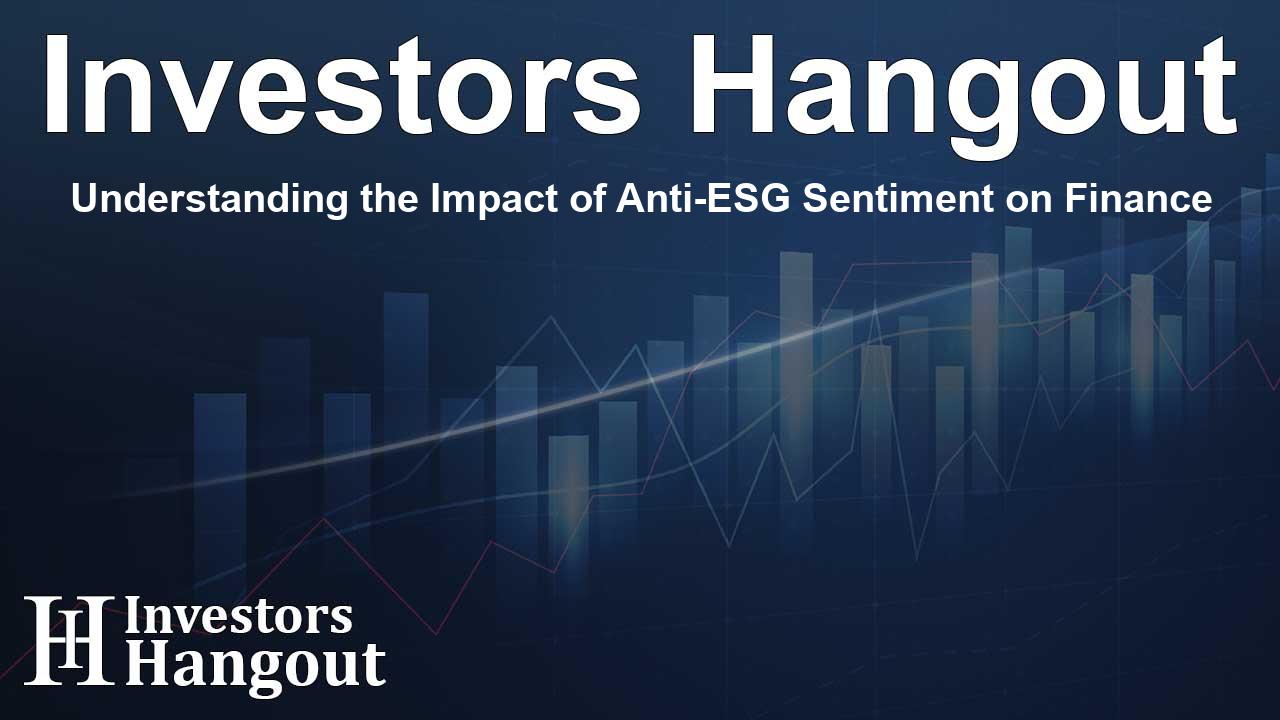Understanding the Impact of Anti-ESG Sentiment on Finance

Understanding the Impact of Anti-ESG Sentiment on Finance
Recent discussions have emerged regarding the influence of the anti-environmental, social, and governance (ESG) sentiment in the finance sector, particularly within the United States. A JPMorgan executive has provided valuable insights, asserting that this backlash is often exaggerated and does not significantly affect the expanding green economy.
Complexity Beneath the Surface
Chuka Umunna, who holds the position of JPMorgan's global head of sustainable solutions, addressed the matter during the Reuters Energy Transition conference. He emphasized that despite some U.S. companies and investors becoming quieter about sustainability issues, their financial movements remain largely aligned with those of their European counterparts.
Umunna notes that if one looks beyond the surface noise surrounding the anti-ESG discourse, it becomes clear that investor behaviors are not drastically different. He remarked, 'If you peel away all the noise and look at what investors are doing, it isn't so different,' even if they aren't using ESG terminology as explicitly as in Europe.
Political Influences on Investment
The political landscape in the United States has indeed influenced perceptions and approaches to ESG. There have been reports of U.S. investors withdrawing from global climate initiatives amid concerns that participation may conflict with antitrust regulations. This shift has illustrated that while some elements of the investment community may be exhibiting caution, the broader commitment to sustainability remains intact.
Statistically, the situation reflects a moderate resistance to the anti-ESG sentiment. Umunna highlighted that although a number of anti-ESG resolutions surfaced during recent proxy voting seasons, the success rate was minimal. Specifically, he indicated that less than 2% of these resolutions were approved, and at the state level, under 10% of anti-ESG proposals actually made it through legislative processes.
Investment Challenges Beyond ESG
For firms actively seeking investment in the current economic climate, the greater hurdles are perceived to be external factors like inflation, supply chain disruptions, and rising interest rates. Umunna suggested that these challenges could be more influential on market valuations than the mainstream discourse surrounding ESG.
He said, 'Is all the noise depressing the valuations? I'm not sure it necessarily is,' highlighting that fundamental economic issues play a predominant role in shaping the financial landscape.
Navigating Investment Strategies in a Shifting Landscape
As the discourse around ESG evolves, firms may need to adapt their strategies to resonate with investors who are wary of potential backlash. However, Umunna reassured participants that major global clients of JPMorgan's fund division typically adhere to a unified investment stewardship policy across different markets. This indicates a commitment to sustainability that transcends local political currents, thus maintaining investment integrity.
The Future of ESG Investments
Looking ahead, it is crucial for investors and companies to remain attuned to the dynamics of ESG. The current political climate may shift perceptions, but the underlying demand for sustainable investment is steadily growing. Umunna's remarks suggest a more nuanced picture of the impact of anti-ESG sentiment, highlighting that substantive issues may ultimately dictate the trajectory of investments.
Frequently Asked Questions
What does the anti-ESG backlash mean for investors?
The anti-ESG backlash may create a cautious approach among some investors, but its direct impact on investment strategies remains limited, according to JPMorgan.
Are companies continuing to invest in ESG initiatives?
Despite the challenges, many companies are maintaining their commitment to ESG initiatives, showing alignment with global trends.
What are the main challenges for companies seeking investment?
Higher inflation rates, supply chain disruptions, and increased interest rates are currently the primary obstacles firms are facing in securing investments.
How significant are anti-ESG resolutions?
Anti-ESG resolutions have had a low success rate, with less than 2% passing during the latest voting season, indicating limited traction.
What is the future outlook for ESG investments?
The demand for sustainable investments is expected to grow, suggesting that ESG principles will continue to play a pivotal role in investment decisions.
About The Author
Contact Henry Turner privately here. Or send an email with ATTN: Henry Turner as the subject to contact@investorshangout.com.
About Investors Hangout
Investors Hangout is a leading online stock forum for financial discussion and learning, offering a wide range of free tools and resources. It draws in traders of all levels, who exchange market knowledge, investigate trading tactics, and keep an eye on industry developments in real time. Featuring financial articles, stock message boards, quotes, charts, company profiles, and live news updates. Through cooperative learning and a wealth of informational resources, it helps users from novices creating their first portfolios to experts honing their techniques. Join Investors Hangout today: https://investorshangout.com/
The content of this article is based on factual, publicly available information and does not represent legal, financial, or investment advice. Investors Hangout does not offer financial advice, and the author is not a licensed financial advisor. Consult a qualified advisor before making any financial or investment decisions based on this article. This article should not be considered advice to purchase, sell, or hold any securities or other investments. If any of the material provided here is inaccurate, please contact us for corrections.
